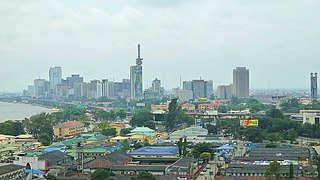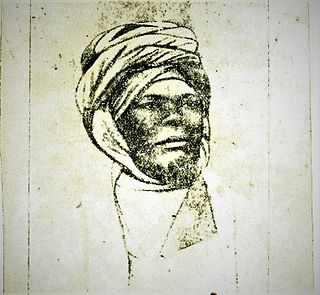
Lagos, or Lagos City, is a city in Nigeria. With an estimated population of 21 million in 2015, it claimed to be the most populous in the country. Lagos is the most populous urban area in Africa. Lagos was the national capital of Nigeria until December 1991 following the government's decision to move their capital to Abuja in the centre of the country. Lagos is a major African financial centre and is the economic hub of Lagos State and Nigeria at large. The city has a significant influence on commerce, entertainment, technology, education, politics, tourism, art, and fashion in Africa. Lagos is also among the top ten of the world's fastest-growing cities and urban areas. The megacity has the fourth-highest GDP in Africa and houses one of the largest and busiest seaports on the continent. Due to the large urban population and port traffic volumes, Lagos is classified as a Medium-Port Megacity.

Lagos State is a state in southwestern Nigeria. Out of the 36 states, it is the second most populous state and the smallest in area. Bounded to the south by the Bight of Benin and to the west by the international border with Benin for ten km, Lagos State borders Ogun State to the north for about 283 km, making it the only Nigerian state to border only one other state. Named for the city of Lagos—the most populous city in Africa—the state was formed from the Western Region and the former Federal Capital Territory on 27 May 1967.

Efunroye Tinubu, born Ẹfúnpọ̀róyè Ọ̀ṣuntinúbú, was a powerful Yoruba female aristocrat, merchant, and slave trader in pre-colonial and colonial Nigeria.

Badagry Division is an administrative division of Lagos State in Nigeria.
Akitoye, sometimes wrongly referred to as Akintoye, reigned twice as Oba of Lagos; first, from 1841 to 1845, and a second time, from 1851 to 1853. His father was Oba Ologun Kutere and his siblings were Obas Osinlokun and Adele.
Chief Ademola Rasaq Seriki, CON, also known as Demola Seriki, was a Nigerian politician, teacher, businessman, and public administrator. He served until his death as the Nigerian ambassador to Spain, a position he assumed in January 2021, with concurrent accreditation as a permanent representative of Nigeria to the United Nations World Tourism Organization (UNWTO). He previously served as Nigeria's Minister of State for Defence.

Badagry, also spelled Badagri, is a coastal town and Local Government Area (LGA) in Lagos State, Nigeria. It is quite close to the city of Lagos, and located on the north bank of Porto Novo Creek, an inland waterway that connects Lagos to the Beninese capital of Porto-Novo. The same route connects Lagos, Ilaro, and Porto-Novo, and shares a border with the Republic of Benin. As of the preliminary 2006 census results, the municipality had a population of 241,093.

St. Gregory's College, Lagos, is a Catholic Boys' School with boarding facilities, located 1.0 km from Tafawa Balewa Square in the vicinity of Ikoyi – Obalende, Lagos State, Nigeria.
Brazilians in Nigeria, Amaros or Agudas consist of the descendants of freed Afro-Brazilian slaves who left Brazil and settled in Benin, Togo and Nigeria. The term Brazilians in Nigeria can also otherwise refer to first generation expatriates from Brazil.
The Ecclesiastical Province of Lagos is one of the 14 ecclesiastical provinces of the Church of Nigeria. It comprises 13 dioceses:

Gberefu Island also known as Point of No Return is a populated historical island located in Badagry, a town and local government area of Lagos State, South-Western Nigeria. Symbolized by two poles slightly slanted towards each other and facing the Atlantic Ocean, the island was a major slave port after it was opened in 1473 during the Trans-Atlantic Slave Trade era. According to Nigerian historians, as many as 3 million slaves were believed to have been shipped to the Caribbean and Americas between 1518 and 1880 from the island.
Badagry Festival is an annual event held in Badagry, a town in Lagos State, Nigeria. It is organised by the African Renaissance Foundation (AREFO). The event reflects the significance of the ancient town during the slave trade era. It is a convergence of culture and display of African heritage. The organizer brings the indegine and culture-loving fans from around the world to celebrate the festival. One of the major highlights is the artistic display by masquerades, dancers, and fire eaters. It features football competition, the beating of Sato drum, and Liberation Day Celebration.

The Vlekete Slave Market is a market located in Badagry, Lagos State. Established in 1502 and named after the Vlekete deity, the goddess of the ocean and wind the market was significant during the Atlantic slave trade in Badagry, as it served as a business point where African middlemen sold slaves to European slave merchants, thus making it one of the most populous slave markets in West Africa.
Faridah Demola Seriki, known professionally as Kah-Lo is a Nigerian singer-songwriter, best known for her song "Fasta" and for her work on "Rinse and Repeat" with British DJ Riton. The track was nominated for Best Dance Recording at the 59th Grammy Awards. Together, she and Riton have released "Betta Riddim", "Money" ft. Mr. Eazi and Davido, and Triple J hits "Fake ID" and "Ginger".

Timothy E. McPherson Jr is a descendant of the Nanny Town Maroons and he is the chairman for the Economic Community of States, Nations, Territories and Realms of the African Diaspora Sixth Region (ECO-6) and he is also the founding governor of the Central Solar Reserve Bank of Accompong, which he created during his tenor as the minister of Finance for the Accompong Maroons. He is Chairman of the Door of Return initiative, which is being spearheaded across Africa in cooperation with Ghana and Nigeria as part of the United Nations' (UN) International Decade for People of African Descent. During the 2018 Door of Return celebration in Nigeria, McPherson was officially honoured by the Akran of Badagry Kingdom and conferred with the Royal Chieftaincy title as "Yenwa of Badagry Kingdom".

Mohammed Shitta-Bey, alias Olowo Pupa, was the first titled Seriki Musulumi of Lagos. He was a prominent Nigerian Muslim businessman, aristocrat and philanthropist who was involved in commerce across Lagos and the Niger-Delta region. He was also a patron of the Shitta-Bey Mosque in Lagos, and served as a leader in the Lagos Muslim community until his death. He is known to be one of the founding fathers of legitimate commerce in precolonial Nigeria; as at the time of his death he was the most prominent and wealthiest Muslim trader in West Africa.
Iju also known as Iju Oloko [idʒou ɔ:lɔkɔ], is a Nigerian town located in southern Ogun state and about 18 kilometers from Lagos state, a major commercial hub in West Africa. The town is inhabited mostly by Egba/Owu natives whose ancestors settled there between 1842 and 1845.

Yusuf Maitama Tuggar is a Nigerian diplomat and politician who is the current Nigerian minister of foreign affairs. He served as the Nigerian Ambassador to Germany from 2017 to 2023. He was previously a member of the Nigerian House of Representatives from 2007 to 2011 representing Gamawa; and he ran twice for the office of the governor of Bauchi State.
Florence Seriki MFR was the founder and CEO of Omatek Ventures Plc., the first Nigerian ICT company in Africa to assemble and manufacture computers and computer parts like computer cases, speakers, keyboards, mouse.
The Anglican Diocese of Lagos is one of 13 dioceses within the Anglican Province of Lagos, itself one of 14 provinces within the Church of Nigeria. The current bishop is Ifedola Senasu Gabriel Okupevi who succeeded the late Humphrey Bamisebi Olumakaiye.











